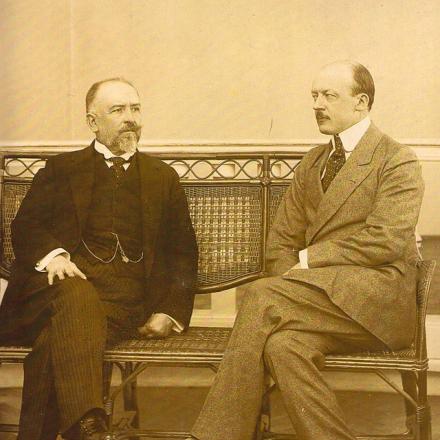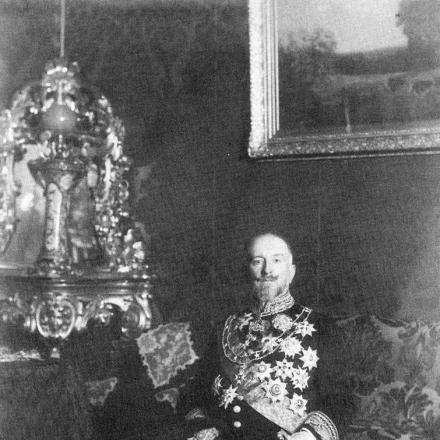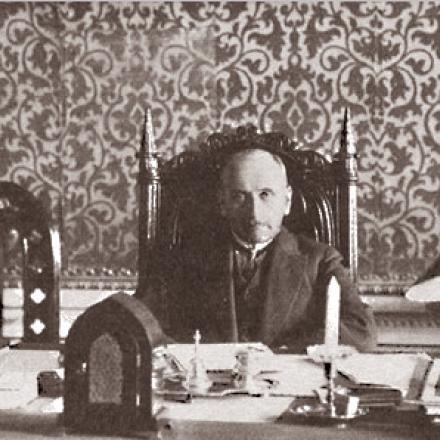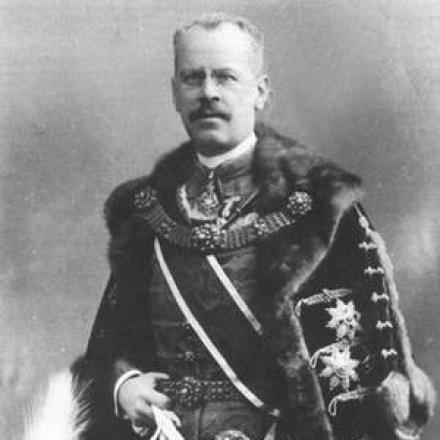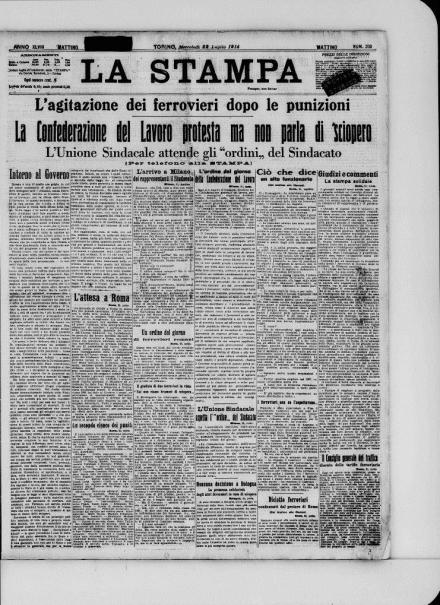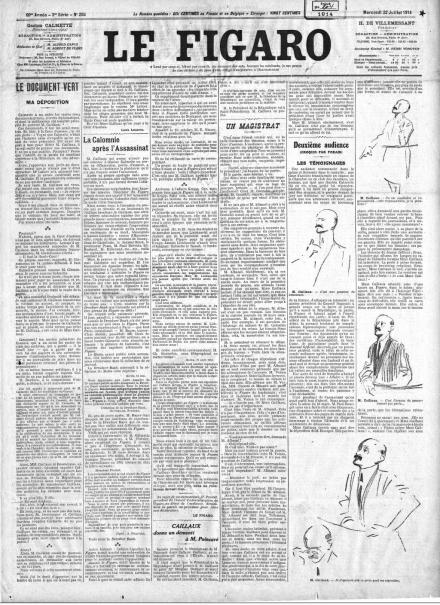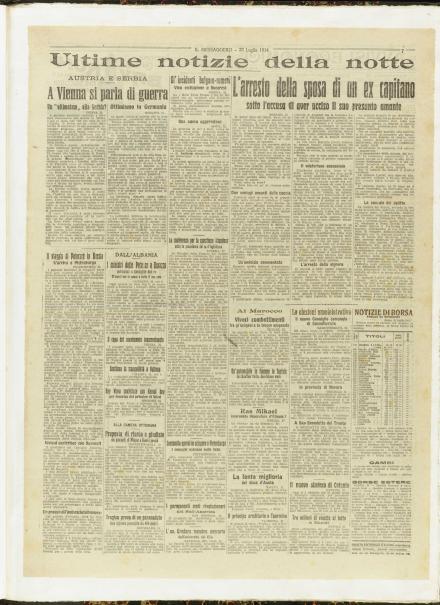Segni di irrequietezza dalla borsa
Manca un giorno alla consegna dell’ultimatum. Il Ministro degli esteri italiano, Antonino di San Giuliano, incontra l’Ambasciatore asburgico Kajetan Mérey. Il 22 luglio un conflitto forse non è probabile, ma resta sempre una possibilità. È l’occasione per discutere degli eventuali compensi territoriali all’Italia. In caso di guerra nei Balcani, va trovato un accordo preventivo. L’articolo 7 nel trattato della Triplice alleanza è chiaro: è un modo per indennizzare l’altra Potenza al mutare del panorama geopolitico in quella regione.
Di guerra meglio non parlare; non siamo pronti. Non abbiamo le risorse economiche e industriali; le nostre truppe sono mal equipaggiate, con pochi sottufficiali e un addestramento limitato; la nostra aviazione conta meno di novanta aerei. Siamo stati noi a teorizzarne l’importanza, ma nel 1914 facciamo volare solo i piccioni viaggiatori, o quasi. E poi abbiamo chiuso da poco la guerra italo-turca, che non sarà stata la più affascinante di sempre, ma i soldati sono morti uguale, i soldi sono stati spesi e le conseguenze ci impegnano ancora in Libia, dove teniamo dislocato un discreto contingente a operare contro i ribelli.
Anche San Pietroburgo parla con Vienna. Sazonov, Ministro degli esteri russo, alza la voce e diffida l’Austria-Ungheria dal calcare troppo la mano. La nota diplomatica non deve ledere la dignità e la sovranità nazionale della Serbia. Sazonov non parla però di escalation militare. Le impressioni tedesche e austro-ungariche sembrano confermate: can che abbaia non morde.
La Borsa è meno tranquilla. A Vienna e Berlino mostra una preoccupante irrequietezza da almeno un paio di giorni. Nessuno si allarma; viene considerata la conseguenza di speculazioni e del clima giornalistico.
Davide Sartori
GLI AVVENIMENTI
Politica e società
- Il testo finale dell’ultimatum viene anticipato all’Ambasciata tedesca a Vienna.
- L’Austria-Ungheria vorrebbe che fosse il Ministro degli esteri tedesco a consegnare l’ultimatum a Belgrado, ma la Germania rifiuta.
- Il Ministro degli esteri italiano, Antonino di San Giuliano, incontra l’Ambasciatore austriaco Kajetan Mérey.
- Gli insorti albanesi chiedono ai Ministri delle Potenze l'immediato allontanamento del Principe William di Wied.
Parole d'epoca
Conte Berchtold
agli Ambasciatori Imperiali e Reali di Berlino, Roma, Parigi, Londra, San Petersburgo e Costantinopoli
(Tradotto dal francese)
The Imperial and Royal Government felt compelled to address the following note to the Royal Servian Government on Thursday, the 23rd instant, through the medium of the Imperial and Royal Minister at Belgrade (see instructions to the Imperial and Royal Envoy in Belgrade of July 22nd, 1914).On the 31st March 1909, the Royal Servian Government addressed to Austria-Hungary the declaration of which the text is reproduced above.On the very day after this declaration Servia embarked on a policy of instilling revolutionary ideas into the Serb subjects of the Austro-Hungarian Monarchy, and so preparing for the separation of the Austro-Hungarian territory on the Servian frontier.Servia became the centre of a criminal agitation.No time was lost in the formation of societies and groups, whose object, either avowed or secret, was the creation of disorders on Austro-Hungarian territory.
These societies and groups count among their members generals and diplomatists, Government officials and judges -- in short, men at the top of official and unofficial society in the kingdom.Servian journalism is almost entirely at the service of this propaganda, which is directed against Austria-Hungary, and not a day passes without the organs of the Servian press stirring up their readers to hatred or contempt for the neighbouring Monarchy, or to outrages directed more or less openly against its security and integrity.
A large number of agents are employed in carrying on by every means the agitation against Austria-Hungary and corrupting the youth in the frontier provinces.Since the recent Balkan crisis there has been a recrudescence of the spirit of conspiracy inherent in Servian politicians, which has left such sanguinary imprints on the history of the kingdom; individuals belonging formerly to bands employed in Macedonia have come to place themselves at the disposal of the terrorist propaganda against Austria-Hungary.In the presence of these doings, to which Austria-Hungary has been exposed for years, the Servian Government have not thought it incumbent on them to take the slightest step. The Servian Government have thus failed in the duty imposed on them by the solemn declaration of the 31st March, 1909, and acted in opposition to the will of Europe and the undertaking given to Austria-Hungary. The patience of the Imperial and Royal Government in the face of the provocative attitude of Servia was inspired by the territorial disinterestedness of the Austro-Hungarian Monarchy and the hope that the Servian Government would end in spite of everything by appreciating Austria-Hungary's friendship at its true value. By observing a benevolent attitude towards the political interests of Servia, the Imperial and Royal Government hoped that the kingdom would finally decide to follow an analogous line of conduct on its own side. In particular, Austria-Hungary expected a development of this kind in the political ideas of Servia, when, after the events of 1912, the Imperial and Royal Government, by its disinterested and ungrudging attitude, made such a considerable aggrandizement, of Servia possible.The benevolence which Austria-Hungary showed towards the neighbouring State had no restraining effect on the proceedings of the kingdom, which continued to tolerate on its territory a propaganda of which the fatal consequences were demonstrated to the whole world on the 28th June last, when the Heir Presumptive to the Monarchy and his illustrious consort fell victims to a plot hatched at Belgrade.In the presence of this state of things the Imperial and Royal Government have felt compelled to take new and urgent steps at Belgrade with a view to inducing the Servian Government to stop the incendiary movement that is threatening the security and integrity of the Austro-Hungarian Monarchy.The Imperial and Royal Government are convinced that in taking this step they will find themselves in full agreement with the sentiments of all civilised nations, who cannot permit regicide to become a weapon that can be employed with impunity in political, strife, and the peace of Europe to be continually disturbed by movements emanating from Belgrade.In support of the above the Imperial and Royal Government hold at the disposal of the British Government a dossier elucidating the Servian intrigues and the connection between these intrigues and the murder of the 28th June.An identical communication has been addressed to the Imperial and Royal representatives accredited to the other signatory Powers.You are authorized to leave a copy of this despatch in the hands of the Minister for Foreign Affairs.
